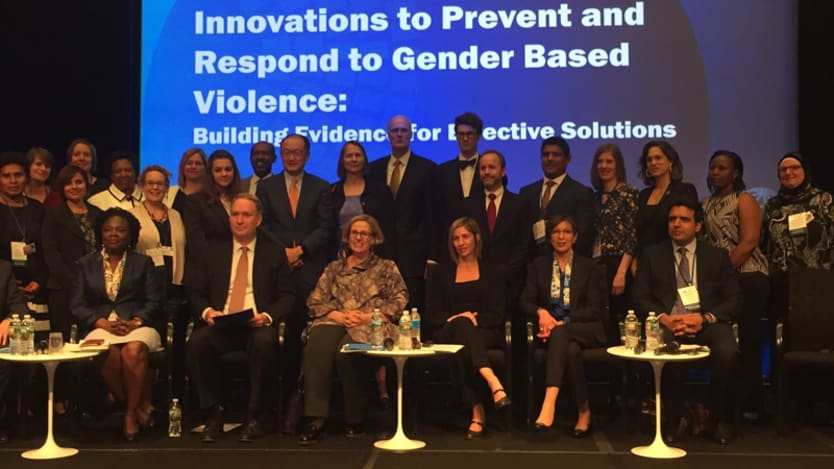
World Bank President Jim Kim has called gender-based violence against women and girls a “worldwide epidemic” that “undermines all our work to end poverty and boost shared prosperity.”
Speaking during the World Bank and IMF Spring Meetings in Washington, D.C., Kim described GBV as “completely preventable” and vowed to make its prevention a priority during his second term as head of the institution.
The World Health Organization estimates that more than one-third of all women have suffered gender-based violence in their lifetime, while a 2014 World Bank report estimated GBV could cost a country up to 3.7 percent of its gross domestic product, equivalent to what most governments spend on primary education.
“This is a moral issue — we cannot stand by while so many women suffer harm that is completely preventable, but this is also an issue that … undermines all our work to end poverty and boost shared prosperity — lost productivity, lost work days, health care costs, stories of human suffering, much of which is left untold,” he said.
The World Bank has been ramping up its efforts to tackle GBV in recent years, in part after construction workers at a bank-funded transport project in Uganda were accused of sexual abuse against children and women. The bank cancelled the project and vowed to learn lessons from the “multiple failures” of staff overseeing it.
Speaking at an award ceremony for innovations to prevent and respond to gender-based violence launched by the bank last year in collaboration with the Sexual Violence Research Initiative, Kim outlined a number of bank strategies and projects aimed at helping member countries, and also the bank itself, better prevent GBV from occurring.
The awards — valued at $150,000 each — are distributed through the bank’s Development Marketplace, a grants program for innovative solutions. This year 10 recipients were in D.C. to receive their awards. Before they were handed out, Kim said the bank would spend a minimum of $3.5 million on more development marketplace initiatives to combat GBV.
The GBV marketplace grants were launched last year in memory of Hannah Graham, daughter of a longtime World Bank employee, who was murdered in 2014.
In late 2016 the bank also formed a global gender-based violence task force designed to strengthen the institution’s policies and procedures around identifying and responding to cases of sexual exploitation and abuse in relation to projects it funds.
The task force is led by Geeta Rao Gupta, a gender expert and former deputy executive director for programs at UNICEF, alongside Katherine Sierra, former vice president for sustainable development at the World Bank where she worked for 32 years. The team has nine other members, including Ntenga Moses, head of Joy for Children, the Ugandan NGO that lifted the lid on the sexual abuse being carried out by workers on the bank-funded transport project.
After the Uganda project revelations, the bank implemented a number of improvements to the way it handled GBV risks, Sierra and Gupta explained, the job of the task force is now to assess those changes, identify gaps, and suggest further improvements.
The group will submit its recommendations in June, and the bank will then develop an action plan to implement the suggestions.
“The taskforce was formed to think through what changes need to be made to the processes, systems, policies, behavior and culture within the World Bank in order to make sure in large projects where the bank gives loans to countries to implement and typically those associated with a large influx of labor … that such incidents do not occur again,” Gupta said.
According to Sierra, the abuses in Uganda went unnoticed by the bank due to monitoring systems failures and because staff had neither the knowledge nor the skills to understand what was happening or to address it quickly.
“Once the bank belatedly recognized the issue, it was a very swift and strong response,” she said. “But what we want is that projects going forward understand the risk, put in measures to prevent abuses, and that if offenses happen the response is immediate.”
Recommendations will include stronger risk assessments, engaging local communities to act as early warning systems for possible abuse, as well as providing support to victims, stronger accountability mechanisms for contractors and making sure bank policies are clear, comprehensive and built into the standard practices of the organization, Sierra explained.
Tackling GBV will not be easy, the co-chairs said, and requires a culture change within the bank, but also within member countries.
“We recognize these are very hard issues to discuss and address. It’s not about just saying we have the right policies and procedures in place but also providing staff with the understanding of why GBV is important for development outcomes, it’s not just a moral argument,” Sierra said.
Devex reporters Michael Igoe and Sophie Edwards will be on the ground at the World Bank Spring meetings April 18-22. Stay tuned to Devex for coverage and follow @Sophie_Ed1984 and @AlterIgoe.
Read more about the World Bank-IMF Spring Meetings:
▶ In uncertain times, a clearer World Bank strategy emerges
▶ Kim calls for a 'different and difficult conversation about development finance'
▶ World Bank President Kim wants to change how all DFIs work
▶ The World Bank's new CEO Kristalina Georgieva lays out her vision for an agile bank








